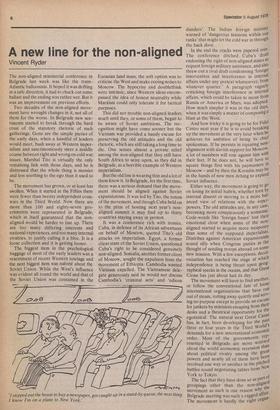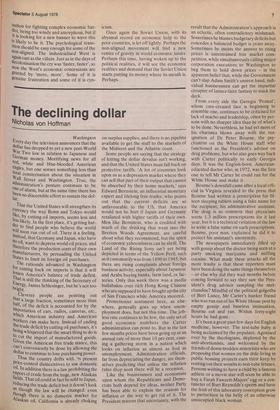A new line for the non-aligned
Vincent Ryder
The non-aligned ministerial conference in Belgrade last week was like the transAtlantic balloonists. It hoped it was drifting in a safe direction, it had to chuck out some ballast and the ending was rather wet. But it was an improvement on previous efforts.
Two decades of the non-aligned movement have wrought changes in it, not all of them for the worse. In Belgrade new sentiments started to break through the hard crust of the statutory rhetoric of such gatherings. Gone are the simple pieties of the early days, when a handful of leaders would meet, bash away at Western imperialism and sanctimoniously steer a middle course between right and wrong on cold war issues. Marshal Tito is virtually the only remaining link with those days, and he is distressed that the whole thing is messier and less soothing to the ego than it used to be.
The movement has grown, or at least has swollen. When it started in the Fifties there were fewer than twenty independent countries in the Third World. Now there are more than 100 and eighty-seven governments were represented in Belgrade, which in itself guaranteed that the nonaligned would be harder to line up. There are too many differing interests and national experiences, and too many internal rivalries, to justify calling it a bloc. It is a loose collection and it is getting looser.
The biggest item in the psychological baggage of most of the early leaders was a resentment of recent Western tutelage and the next biggest item was naiveté about the Soviet Union. While the West's influence was evident all round the world and that of the Soviet Union was contained in the Eurasian land mass, the soft option was to criticise the West and make cooing noises to Moscow. The hypocrisy and doublethink were intrinsic, since Western ideas encompassed the idea of honest neutrality while Marxism could only tolerate it for tactical purposes.
This did not trouble non-aligned leaders much until they, or some of them, began to be aware of Soviet ambitions. The recognition might have come sooner but the Vietnam war provided a handy excuse for preserving the old attitudes and the old rhetoric, which are still taking a long time to die. One senses almost a private relief among the non-aligned that they still have South Africa to seize upon, as they did in Belgrade, as a horrible example of Western imperialism. • But the old line is wearing thin and a lot of them know it. In Belgrade, for the first time, there was a serious demand that the movement should be aligned against Soviet expansionism. It was led by Tito, the totem of the movement, and though Cuba held on to the prize of hosting next year's nonaligned summit it may find up to thirty countries staying away in protest.
It was a conference rich with ironies. Cuba, in defence of its African adventures on behalf of Moscow, quoted Tito's old attacks on imperialism. Egypt, a former client state of the Soviet Union, questioned Cuba's right to be considered genuinely non-aligned. Somalia, another former client of Moscow, sought the expulsion from the movement of Ethiopia. Cambodia wanted Vietnam expelled. The Vietnamese delegate generously said he would not discuss Cambodia's 'criminal acts' and 'odious slanders'. The Indian foreign minister warned of 'dangerous tensions within our ranks' that might let the cold war in through the back door.
In the end the cracks were papered over. The conference ditched Cuba's draft endorsing the right of non-aligned states to request foreign military assistance, and also threw out a rival draft condemning 'foreign intervention and interference in internal affairs under any pretext whatsoever, from whatever quarter.' A paragraph vagtielY criticising foreign interference in internal affairs, which could be taken to mean frog' Russia or America or Mars, was adopted. How much simpler it was in the old days, when it Was simply a matter of composing a blast at the West.
And how tricky it is going to be for Fidel Castro next year if he is to avoid breaking up the movement at the very hour when he achieves his ambition of being its chief spokesman. If he persists in equating non" alignment with slavish support for Moscow, a, lot of members will vote against him with their feet. If he does not, he will have to square things first with his paymasters in Moscow — and by then the Kremlin may be in the hands of new men itching to expand Soviet influence.
Either way, the movement is going to go on losing its initial hubris, whether torn by internal dissent or moving to a more balanced view of relations with the superpowers. The old attitudes are, in any case, becoming more conspicuously a nonsense. Code-words like 'foreign bases' lost their emotional clout when some of the non" aligned started to acquire more weaponrY than some of the supposed imperialists. Diatribes against American expansionism sound silly when Congress panics at the thought of sending troops abroad on some new mission. With a few exceptions, decalonisation has reached the stage at which independence is being thrust upon geographical specks in the oceans, and thatrpG at Cause has just about had its day. The movement will have to find another, or follow the conventional fate of !dose international organisations that have run out of steam, rotting away quietly and set"' ing no purpose except to provide an excuse for junkets by ministers escaping from their desks and a theatrical opportunity for the egotistical. The natural next Great Cause has, in fact, been developing for the Past three or four years in the Third Worl1:5 demands for a new international econorme order. Most of the governments reP: resented in Belgrade are more worriec about the world ecomomic recession thant about political rivalry among the grea powers and nearly all of them have been, involved one way or another in the pitcheu battles round negotiating tables from New York to Tokyo. The fact that they have done so as part groupings other than the non-aligne._!
movement as such is one reason whyrir!'
isation for fighting complex economic battles, being too windy and amorphous, but if it is looking for a new banner to wave this IS likely to be it. The psychological transition should be easy enough for some of the non-aligned. The industrialised West is again cast as the villain. Just as in the days of decolonisation the cry was 'faster, faster', so now the West's economic. concessions are greeted by 'more, more'. Some of it is genuine frustration and some of it is cyn
icism.
Once again the Soviet Union, with its abysmal record on economic help to the poor countries, is let off lightly. Perhaps the non-aligned movement will find a new centre of gravity in world economic issues. Perhaps this time, having woken up to the political realities, it will see the economic realities and demand that the Soviet Union starts putting its money where its mouth is. Perhaps.































 Previous page
Previous page